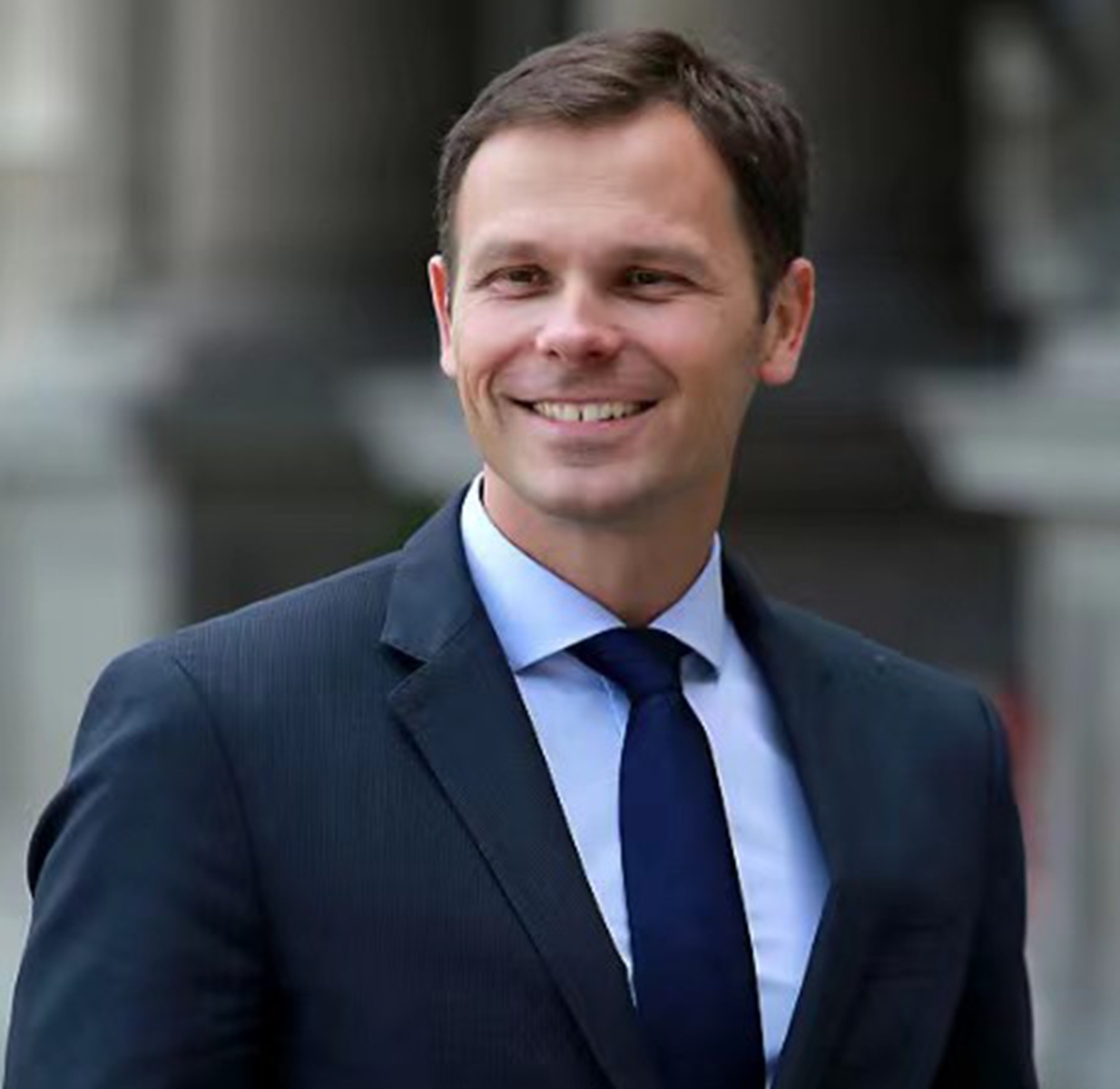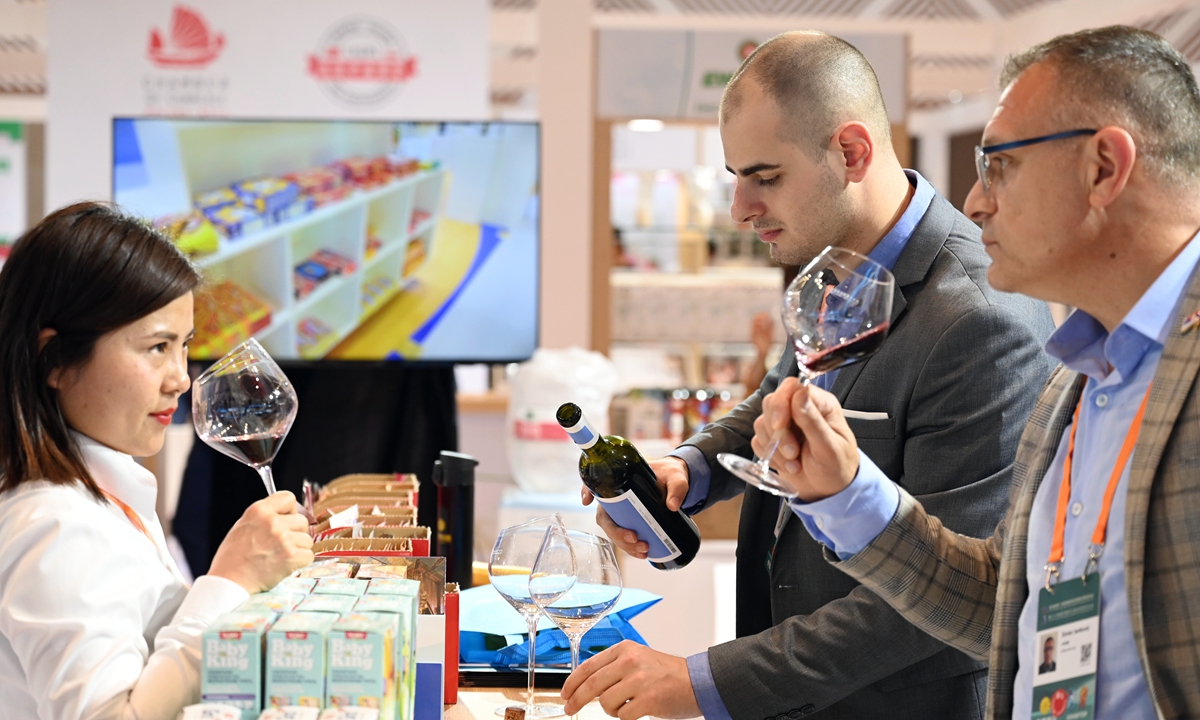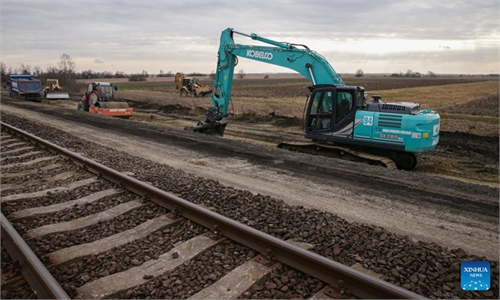IN-DEPTH / DIPLOMATIC CHANNEL
Exclusive: China-Serbia ties set example in turbulent world for what cooperation between like-minded countries can achieve: Serbian Deputy PM
Friends indeed

The city of Belgrade, capital of Serbia Photo:VCG
Editor's Note:
At the China-Central and Eastern European Countries (CEEC) Expo, which concluded in late May in East China's Ningbo, exhibits from Serbia stood out and shone, as did the current relationship between China and Serbia, of which the leaders of both countries have defined as the best in history. The Global Times reporters Hu Yuwei and Xie Wenting (GT) recently conducted an exclusive interview with Siniša Mali (Mali), Deputy Prime Minister of Serbia and Minister of Finance to hear his insights on the relations between two countries. In his eyes, the friendship between China and Serbia is a strong and enduring bond that has been built on a foundation of mutual respect, trust, and cooperation. Over the years, the two nations have worked together to promote peace, stability, and prosperity in the region and beyond.
He suggested that to Serbia, China is one of the closest and most important strategic partners as well as the biggest national investor. The practical economic and trade cooperation between the two countries has shown strong vitality and the bilateral relations are continuously improving thanks to the promotion of the top leaders of the two countries.

Sini?a Mali, Deputy Prime Minister of Serbia and Minister of Finance Photo: Courtesy of Serbian Embassy in Beijing
GT: Over the last nine years since the establishment of the cooperation mechanism between China and Central and Eastern European Countries (CEEC), exchanges in various fields have been enriched. Why and how is the China-CEEC cooperation showing strong momentum?Mali: The last decade has had a decisive impact on the relations between Serbia and China. We take pride in maintaining a "steel friendship" with a nation that is one of the most important players in global politics and one of the most significant economic and political forces in the world today.
Our objective is to proceed with steady improvement and strengthen cooperation, such as in the China-CEEC cooperation mechanism and the Belt and Road Initiative (BRI). Serbia actively and strongly supports both initiatives, through which the entire period of ten years of endeavors have been summarized and this constitutes the most noteworthy quality of our relationship.
GT: China is Serbia's largest trade and financial partner in Asia. Serbia and China have started negotiations on a free trade agreement, which has attracted widespread attention. Can you update us on the progress of the FTA negotiations? When is it expected to be signed? Once signed, to what extent is the cooperation expected to expand?
Mali: I expect the signing of the Free Trade Agreement with China by the end of this year, or at the latest by the beginning of 2024, which would contribute to the further strengthening of the already established "steel friendship" between the two nations.
During a visit to China, Serbian Minister of Agriculture signed protocols in Ningbo on May 16 with China's Vice Minister of the General Administration of Customs Wang Lingjun on the export of honey and pet food to the Chinese market.
A third protocol for the export of apples was also negotiated, which is expected to be signed shortly. This is all good news for our two countries and there is yet more to come.
GT: Serbia-China economic cooperation has been fruitful in recent years, considering that two-way trade volumes have tripled in the last five years. Serbia is also a positive participant in Europe in the BRI. How would you sum up the actual benefits that these projects spearheaded by China have brought to the well-being of Serbians?
Mali: When summarized, the results provide an answer to this question. They clearly reflect all the benefits that Serbia has achieved through close cooperation with China. Through the China-CEEC mechanism, Serbia initiated and implemented a number of infrastructure projects.
We are proud that we have achieved numerous results that secure us a place at the top of the list of countries with the highest number of implemented and planned infrastructure projects with China.
One of the most important events of this year is the start of construction of the Serbian-Chinese Industrial Park Mihajlo Pupin in Belgrade, our capital, which will create about 20,000 jobs. It is a direct and most important advantage for Serbian citizens since modern employment is fundamental to us and we create it through this kind of cooperation; we have found a model that gives fantastic results by which we succeed in reducing the unemployment rate in Serbia to around nine percent, and whether you may believe it or not, only ten years ago it amounted to almost 26 percent.
Serbia is boldly moving forward and achieving good economic results despite the global economic crisis. We do not abandon any capital infrastructure projects, we continue to invest in road and railroad infrastructure, construction of schools and hospitals, and the modernization of the energy sector, of which our excellent cooperation with China plays an important role in our economic progress and development.
China is Serbia's most important trading partner in Asia. The volume of exchange in the last two years has increased by 75 percent. During the last two years, China has been the largest foreign investor in Serbia. Only during the three quarters of 2022, an inflow of investments in the amount of one billion euros was recorded.
All that has been stated above confirms productive cooperation and good investment decisions by the two countries. To reiterate, it is the most important achievement to date.
GT: Serbia is China's first strategic partner in Central and Eastern Europe and an important notch in the BRI in the region. In the future, how will Serbia play a decisive role in strengthening the integration between China and Central and Eastern Europe?
Mali: I am not certain whether our role will be decisive, but I have faith that other countries in Central and Eastern Europe are eager to develop such a type of cooperation that we have accomplished.
Relations between Serbia and China are currently the best they have ever been in history and they are constantly improving, with the growth of economic parameters, investments, imports, exports, and employment.
We should bear in mind that very cordial relationship between the two Presidents, Xi Jinping and Aleksandar Vucic, certainly constitutes the basis and core of good economic cooperation. Until recently, the most important area of economic cooperation was the implementation of infrastructure projects in Serbia. Recently, with the arrival of significant Chinese companies - investors, investment cooperation, accompanied by the growth of trade, especially in terms of our exports, became the engine for the further strengthening of our economic relations.
Chinese investors in Serbia invest not only in mines and steel mills, but also in the automotive industry. Chinese companies in Serbia currently employ just over 26,000 people. Most employees are in the automotive industry, followed by the mining and energy sector, the metal machinery industry and the electrical industry.
Companies owned by Chinese investors in Serbia are the top three exporters from Serbia to the world, generating $2.9-billion-worth of exports in 2022, or 10 percent of Serbia's total exports to the world.
Accurately, taking after the case of Serbia, I believe that China as of now has its own model of how to reinforce its integration with other countries, where required.

Serbian exhibitors taste wine with Chinese buyers at the China-CEEC Expo in East China's Ningbo on May 16, 2023. Photo: VCG
GT: The Budapest-Belgrade railway project is a landmark project by the China-CEEC Cooperation. The arduous task of laying rail for the project has gotten underway. The Budapest-Belgrade railway has been open and operating for over a year. How has it promoted connectivity between Serbia and neighboring countries?
Mali: The participation of Chinese companies in framework ventures in Serbia records a wealthy involvement. You have mentioned one of the most important projects, which will, upon its completion, be of immeasurable importance for faster transport connections between Serbia and its neighboring countries.
The modernization and reconstruction of the Hungarian-Serbian railway line Belgrade-Budapest is underway, on which two sections have been completed and where the high-speed line Belgrade-Novi Sad, which connects our two largest cities, came into service in March 2022, followed by various important roads that connect our country.
Together, we are also building the metro in our capital, a project that has been pending for decades. The promotion of better transport connections between Serbia and its neighboring countries is certainly news that investors are very pleased about, so there is no doubt that this project will only bring us benefits.
GT: "A friend in need is a friend indeed!" This is how President Vucic described what China is to Serbia and the Serbian people. More than 1.4 billion Chinese people also regard Serbia as an "iron-clad friend" on the other end of Eurasia. What fosters such a profound friendship between the two great nations?
Mali: Trustworthiness, respect, and similar traditional family values that are still cherished and appreciated both in Serbia and China; a genuine understanding of the two nations, mutual respect, and appreciation.
In a nutshell, it is the essence that we recognized in each other and which the two countries later upgraded with comprehensive economic cooperation.
GT: China has been actively exploring a modernization path that suits its realities. How can the Chinese path to modernization bring new development opportunities to the rest of the world including Serbia?
Mali: When two countries have joint infrastructure projects, it is not just cooperation related to these specific projects that ends with the completion of the projects themselves. It entails a multi-layered exchange of experiences, experts, technology, opinions, and ideas, which later on, very frequently experience further development through other collaborations and projects.
This is also happening with the presence of China in Serbia, and we are grateful for all the innovative technologies, ideas, and modernization that they have brought along.
GT: China and Serbia have been safeguarding their respective legitimate rights and interests. How could the two countries contribute to the fairness and justice of the world through joint efforts in the near future?
Mali: Undoubtedly, I am deeply convinced that by continuing our earnest friendship, we can show the world how, to share fulfillment; the relationship between the two countries ought to be built. There is a lot of turbulence, disagreements, and misunderstandings in the world. There are exceptionally few examples of what our relationship is.
We would be very happy and appreciate it if, apart from development, infrastructure projects, job creation for our citizens, and so forth, our relationship ought to set an example for other nations.


